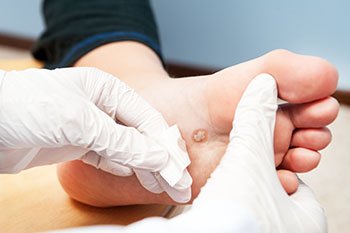 Plantar warts are warts that appear on the bottom of the feet. They are caused by the human papillomavirus, also known as HPV. A plantar wart may resemble a callus, as it is characterized by tough, thick tissue. It may cause pain while you stand or walk, or when any pressure is applied to it. Tiny black dots, which are actually dried blood contained in tiny blood vessels, often appear on the surface of plantar warts. There are two types of plantar warts. Solitary plantar warts are single warts that appear on their own and slowly increase in size. They may eventually multiply, forming additional warts. Mosaic plantar warts are a cluster of several small warts that grow together in the same area, and are usually more difficult to treat. If you have plantar warts, it is strongly recommended that you visit a podiatrist for treatment.
Plantar warts are warts that appear on the bottom of the feet. They are caused by the human papillomavirus, also known as HPV. A plantar wart may resemble a callus, as it is characterized by tough, thick tissue. It may cause pain while you stand or walk, or when any pressure is applied to it. Tiny black dots, which are actually dried blood contained in tiny blood vessels, often appear on the surface of plantar warts. There are two types of plantar warts. Solitary plantar warts are single warts that appear on their own and slowly increase in size. They may eventually multiply, forming additional warts. Mosaic plantar warts are a cluster of several small warts that grow together in the same area, and are usually more difficult to treat. If you have plantar warts, it is strongly recommended that you visit a podiatrist for treatment.
Plantar warts can be very uncomfortable. If you need your feet checked, contact one of our podiatrists from Riznyk Podiatry. Our doctors will assist you with all of your foot and ankle needs.
About Plantar Warts
Plantar warts are the result of HPV, or human papillomavirus, getting into open wounds on the feet. They are mostly found on the heels or balls of the feet.
While plantar warts are generally harmless, those experiencing excessive pain or those suffering from diabetes or a compromised immune system require immediate medical care. Plantar warts are easily diagnosed, usually through scraping off a bit of rough skin or by getting a biopsy.
Symptoms
Treatment
To help prevent developing plantar warts, avoid walking barefoot over abrasive surfaces that can cause cuts or wounds for HPV to get into. Avoiding direct contact with other warts, as well as not picking or rubbing existing warts, can help prevent the further spread of plantar warts. However, if you think you have developed plantar warts, speak to your podiatrist. He or she can diagnose the warts on your feet and recommend the appropriate treatment options.
If you have any questions please feel free to contact our office located in Orchard Park, NY . We offer the newest diagnostic and treatment technologies for all your foot and ankle needs.